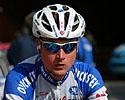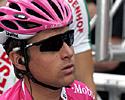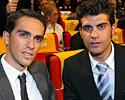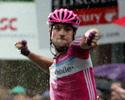First Edition Cycling News for November 4, 2007Edited by Laura Weislo Sinkewitz exposes doping detailsBy Susan Westemeyer
Former T-Mobile rider Patrik Sinkewitz has expanded on his tale of doping in an interview with a German news magazine on Saturday, confessing that he started with doping in 2003, when he joined Quick.Step. "At that time it was EPO that brought you to the top," he told Spiegel. "Then there were things like cortisone or synacthen [a synthetic hormone -ed.]." "It was no secret for anybody as to how you could ride faster," he said of his time at the Belgian team. "I learned about it from both riders and team doctors." The 27-year-old knew how to get around the doping controllers when he was with the Belgian team. "When I knew that a dose could still be detected after five days, then I stopped taking it six days before a race. There were almost never training controls." "In the first few years I didn't know anything about blood doping," he continued. The young German first learned about it in the summer of 2005. At his first T-Mobile team meeting in November 2005, he "directly asked" team doctors Lothar Heinrich and Andreas Schmid about it. "I was told that it was possible." The T-Mobile doctors never forced him to do it and "never said that I had to do it." Sinkewitz noted, "The initiative came from me. It was my impression that the Freiburg doctors did it unwillingly, even very unwillingly. But they wanted to be sure that the riders didn't go looking for someone else to do it, where things might go wrong." Sinkewitz did not find the procedures to be at all risky. "We were working with my own blood," he said. "What could be risky?"
He continued to blood dope up until the first stage of the 2006 Tour de France, despite the fact that team-mates Jan Ullrich and Oscar Sevilla had just been suspended after being named in Operación Puerto. "Actually the doctors didn't want to do it any more, but I said, the blood is there, why shouldn't we use it. What could happen? It was clear anyway that we wouldn't do it any more after the Tour." He received two bags of blood, but there were problems. "They weren't in good condition, the blood simply didn't flow." The bad blood could have proved fatal if it had been injected, proving that the procedure is risky indeed. The beginning of the end came this summer when Sinkewitz was at a training camp before the Tour. "I had two or three small packages of testosterone gel in my wallet, 25 milligrams each. I smeared the contents of one package on my arm on the evening of June 7, before I went to bed. I just assumed that the amount was too little to be detected." He was wrong in that assumption. German national anti-doping agency (NADA) controllers showed up at the camp to perform unannounced tests, and Sinkewitz came back positive for testosterone, and he was fired from T-Mobile. The fact that his positive was made public during the Tour de France gave his case an incredible amount of attention, and the reaction to the news from the German press was so strong that the public television broadcasters quit covering the Tour. "I was the right rider at the right time that everyone could dump on. I was responsible for everything," he complained. "There were many people who used my case in order to get publicity for themselves." Now that he has been made a pariah, Sinkewitz feels isolated. "I could use help now, but nobody is there," he said. His confession could help him in one way. The German news magazine Focus reported that Bonn public prosecutors are willing to close their investigation "against a five-figure fine, in light of his confession." Sinkewitz further hopes that the German cycling federation will be equally merciful and give him a reduced suspension, of only one year. And then he wants to return to riding, for a very simple reason: "I can't do anything else." A positive balance for PereiroBy Antonio J. Salmerón
The Spaniard Caisse d'Epargne, Oscar Pereiro, was tipped by manager Eusebio Unzúe to share leadership in the 2008 Tour de France with Alejandro Valverde after being named winner of the 2006 Tour following the failure of Floyd Landis' appeal of his doping positive in that Tour. Pereiro came upon this Tour victory after being part of a long breakaway which gained nearly 30 minutes on the peloton. He fought hard to stay in contact in the high mountains that year, and knows that in order to live up to the expectations of co-leadership in the Grand Boucle next year, he will have to have luck and maybe slip off the front to gain time before the high mountains. In statements to Cyclingnews.com, Oscar Pereiro pointed toward the winner of the last edition, his countryman Alberto Contador, to be a strong favourite for 2008. "The balance of the Tour's route favours climbers like him, and he is also supported by a great team, many of them who have raced for the defunct Discovery Channel and now for the new Astana." The 30 year-old rider though that the battle to be in the the top ten overall will take place in the Alps. "When we will come to the penultimate stage [time trial], the podium will be decided, and it will only serve to showcase the specialists, as happened in the last edition." Pereiro did not forget about his team-mate Alejandro Valverde. "He has demonstrated that he is qualified to be among the best, as evidenced by having finished sixth, despite the bad time trial stage in Albi. Although it is true that the next Tour is better for pure climbers like Alberto Contador and Cadel Evans, among others, but we must bear in mind that the Tour is won day by day, and can be lost in any moment." Pereiro has not yet decided the schedule he will follow during 2008, having renewed his commitment to the Caisse d'Epargne team for two more years. "It could be very similar to 2007. The only thing that seems clear is the Tour. The Vuelta? Why not; I like it. It was a pity that I was not able to finish the last edition because of unexpected health problems." The Tour winner considered as "relatively positive" his performance in 2007. New and renewed North American races for 2008By Mark Zalewski, North American Editor
Last year at this time it looked like the North American road racing scene was turning a corner – multiple races, both new and existing, were making the jump to UCI status. The result was to be the largest and most highly rated calendar of races on this continent in decades. However, the air was let out of the balloon as race after race (Tour of Utah, Tour of Connecticut, Montreal-Boston) announced postponement or cancellation, largely due to lack of funds. It appeared that American race promoters had bitten off more than they could chew. For 2008 there are new races popping up on the UCI America Tour calendar, but the growth seems to be a little more realistic. Two new races are on the schedule, as opposed to the proposed six in 2007, one of which has already announced a title sponsor. Additionally, races that were in question seem to have new life – namely the Tour de Georgia and the Tour of Utah. One of the most exciting new races is the Colorado Stage race, scheduled for mid-August. The race will bring top-level road racing back to the state that is a road cycling paradise and houses the U.S. governing body, but ironically does not have a major UCI event. The three stages over three days will hearken back to the top level of racing from twenty-plus years ago, starting with a road race from Breckenridge to Beaver Creek, a circuit race in and around Vail Village and a time trial up the old Coors Classic course heading towards Vail Pass. John Dakin of the Vail Valley Foundation, organizers of the event, said that the race has been upgraded to a 2.1 status and that this idea has been brewing for many years. "Road cycling has been on the burner for the foundation and Colorado for a while now," he said. "Vail was an annual stop for the Coors Classic, the mountain bike world championships were here and we have always hoped there would be cycling in the future for us. Finally we are able to pull the trigger on it." While the race does not yet have a title sponsor, something that was a problem for many races last year, the organizers have confidence based upon their many years of promoting world cup ski races and their partnership with Medalist Sports. "We will be working with Medalist Sports and we feel that combined with our organization it will be a strong. We run the world cup ski events every year so we bring sponsorship experience." Cipo talks 'no joke'Following initial reports that former World Champion Mario Cipollini is in talks with the US squad Rock & Republic, the Italian's lawyer categorically denied that his client is fancying a return to racing. For Cipollini to come back to the peloton at age 41, and race for a domestic squad in a foreign country – one which specializes in criteriums and sports a brash, tattooed rock star image complete with Cadillac Escalades as team cars – certainly sounds unbelievable, but team director Frankie Andreu assured Cyclingnews that the story is no joke. "The fact that Cipollini has been in talks with the team is absolutely true," Andreu said on Saturday. "Whether or not he's going to return to racing, I don't know. But he, [team manager] Haldane Morris and [Rock & Republic owner] Michael Ball met in Los Angeles and even went on a ride together." Morris declined to comment, deferring to Ball, who could not be reached for comment. Pfannberger to BarloworldAustrian champion Christian Pfannberger will leave the team Elk Haus-Simplon to join Team Barloworld, according to sport1.at. The 27 year-old expects to ride either the Giro d'Italia or the Tour de France with his new team. "He will be at one of the Grand Tours," his manager Jürgen Pauritsch said. Pfannberger was the world military road champion in 1999 and turned pro in 2001. This year he won the mountain jersey in the Tour of Austria, where he finished fourth overall. Vázquez, Palomares to Grupo Nicolás Mateos-MurciaBy Antonio J. Salmerón The promising young rider Manuel Vázquez, who made his debut in professional cycling in 2006 with Andalucía-Cajasur, has reached a verbal agreement for the next season with the Grupo Nicolás Mateos-Murcia, which will be in the Pro-Continental category in 2008. Vázquez, born in Granada (Andalucía) in 1981, took his first professional victory in the Vuelta a La Rioja in 2006. This season Vázquez won the overall in the Vuelta al Alentejo in Portugal. Coming from Fuerteventura-Canarias, Ukrainian Oleg Chuzda, who has was the U23 time trial national champion in 2007, is close to reaching a contractual agreement with the Grupo Nicolás Mateos-Murcia, as well as the 31 year-old veteran Adrián Palomares. Palomares, who won stages of the Regio Tour and Tour of Britain. Palomares will confront his eighth season as professional rider. The Basque rider Mikel Artetxe (Fuerteventura-Canarias) is also in talks with the team. The Grupo Nicolás Mateos has also picked up local professional riders Jesús Buendia (Barbot), Claudio Casas (Andalucía-Cajasur), Eloy Teruel (G. N. M.), and the U23 riders Javier Chacón (Andalucía), Sergio Domínguez (Soctec), and Rubén Reig, who has raced in 2007 for the Würth team. Team Kenda Tire for 2008In it's 10th year, Team Kenda Tire will bring its mix of seasoned and newer female racers to the US peloton with the goal of higher placings in 2008 National Race Calendar events. New to the team for 2008 will be Jackie Kurth (2006 Junior National RR Champion) and Jacquelyn Crowell (5-time Junior National Champion). The team also picked up several new sponsors, including SRAM, The Allen Group and their Dallas Logistics Hub in addition to Plant Solutions. Team Kenda Tire 2008: Kathryn Clark, Jacquelyn Crowell, Debbie Dust, Lee Farabaugh, Anne Guzman, Kristin Keim, Jackie Kurth, Amy McGuire, Andrea Myers, Yukie Nakamura, Catherine Walberg, and Kristin Wentworth. (All rights reserved/Copyright Future Publishing (Overseas) Limited 2007) |

|
January 2009 |
Recently on Cyclingnews.com |




